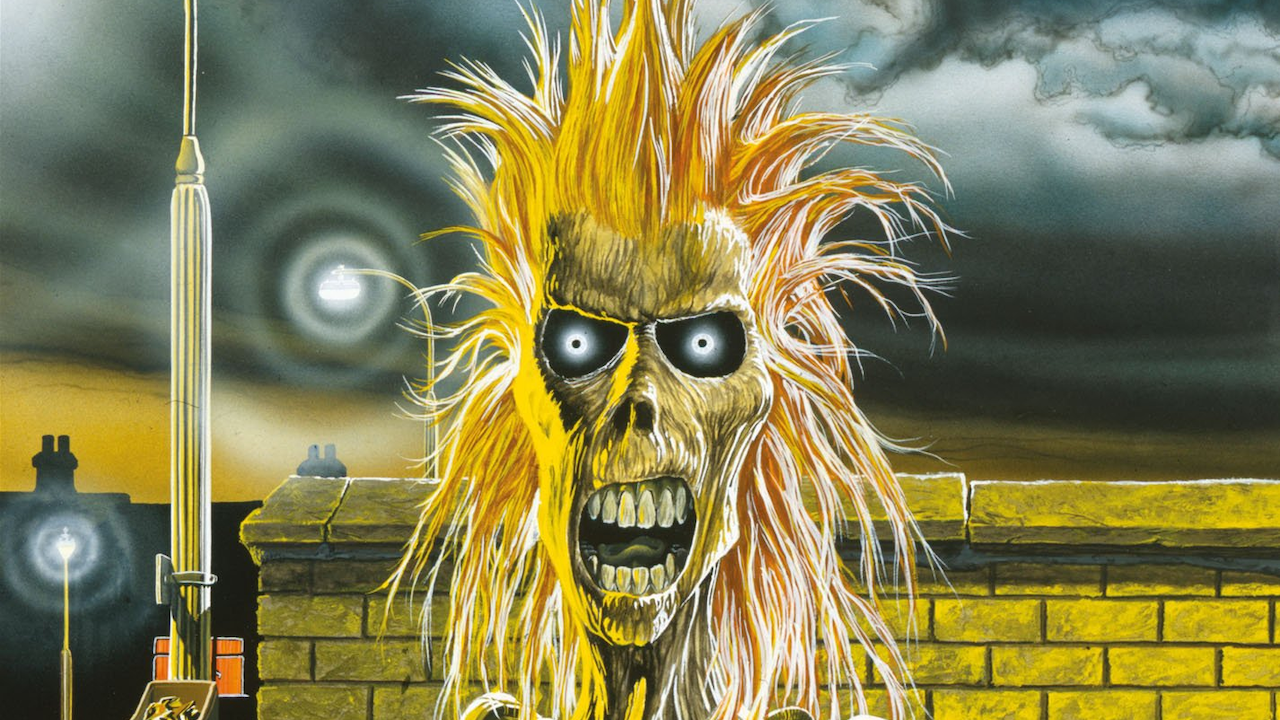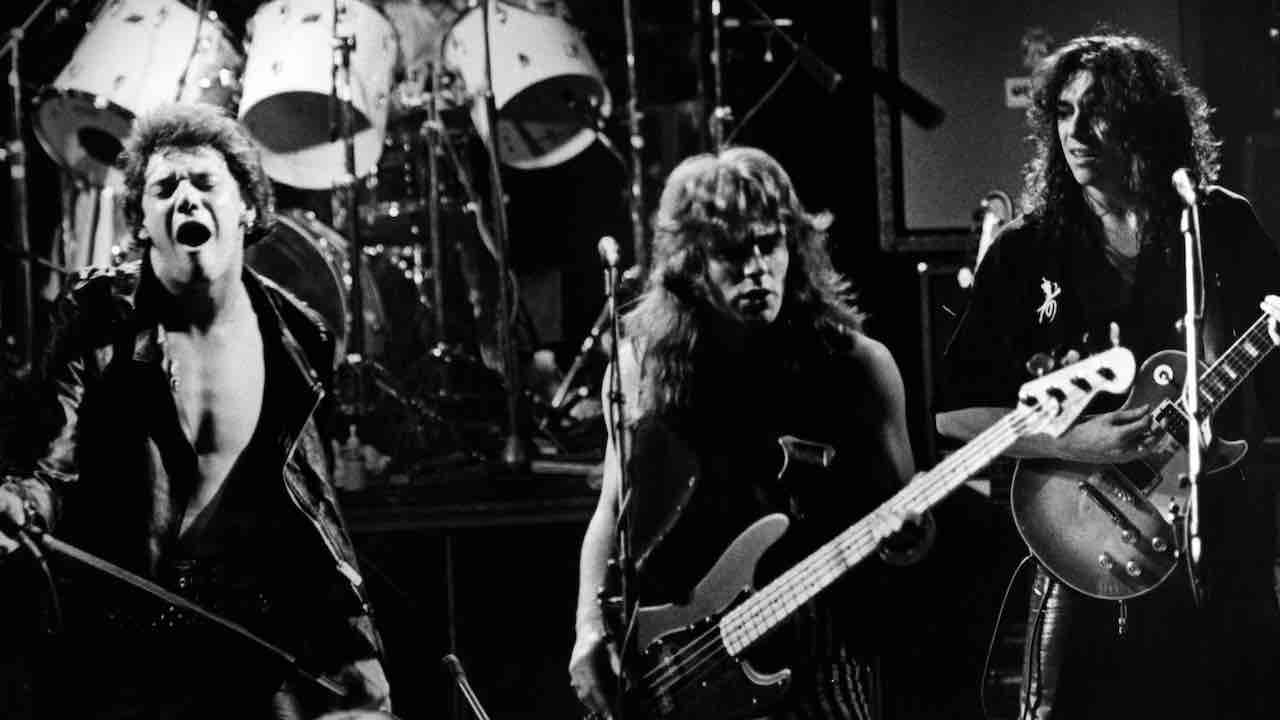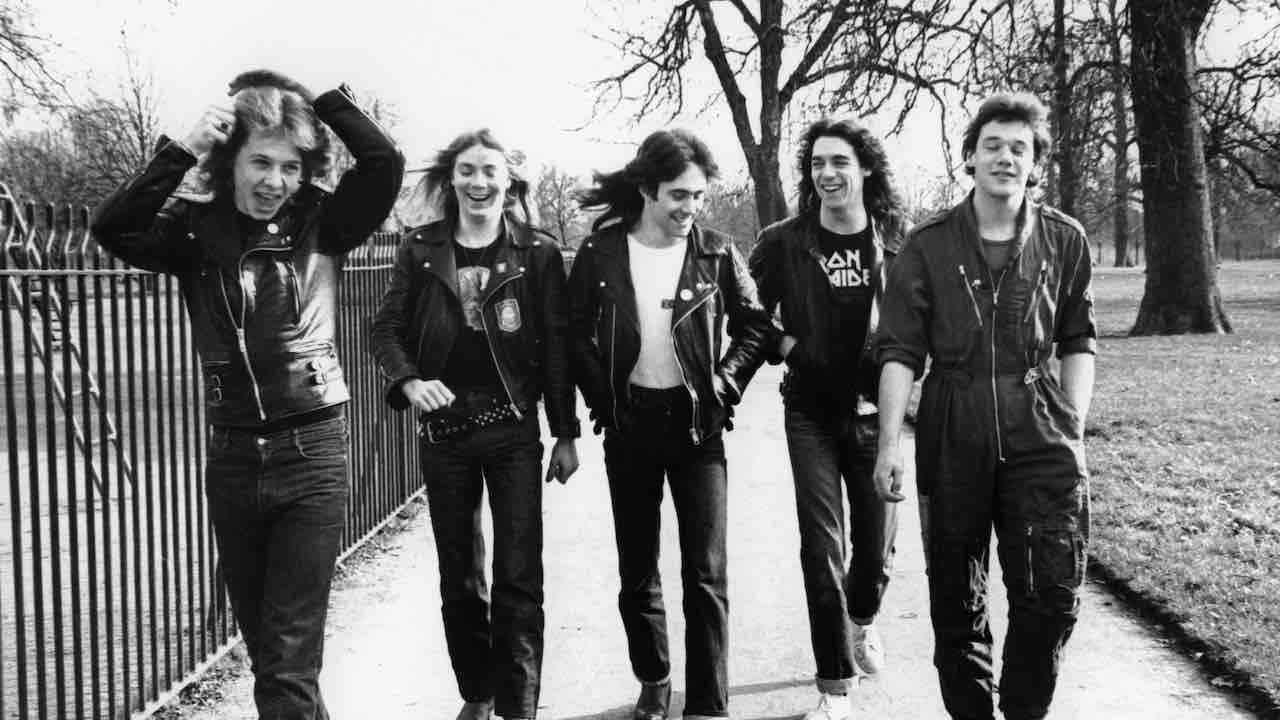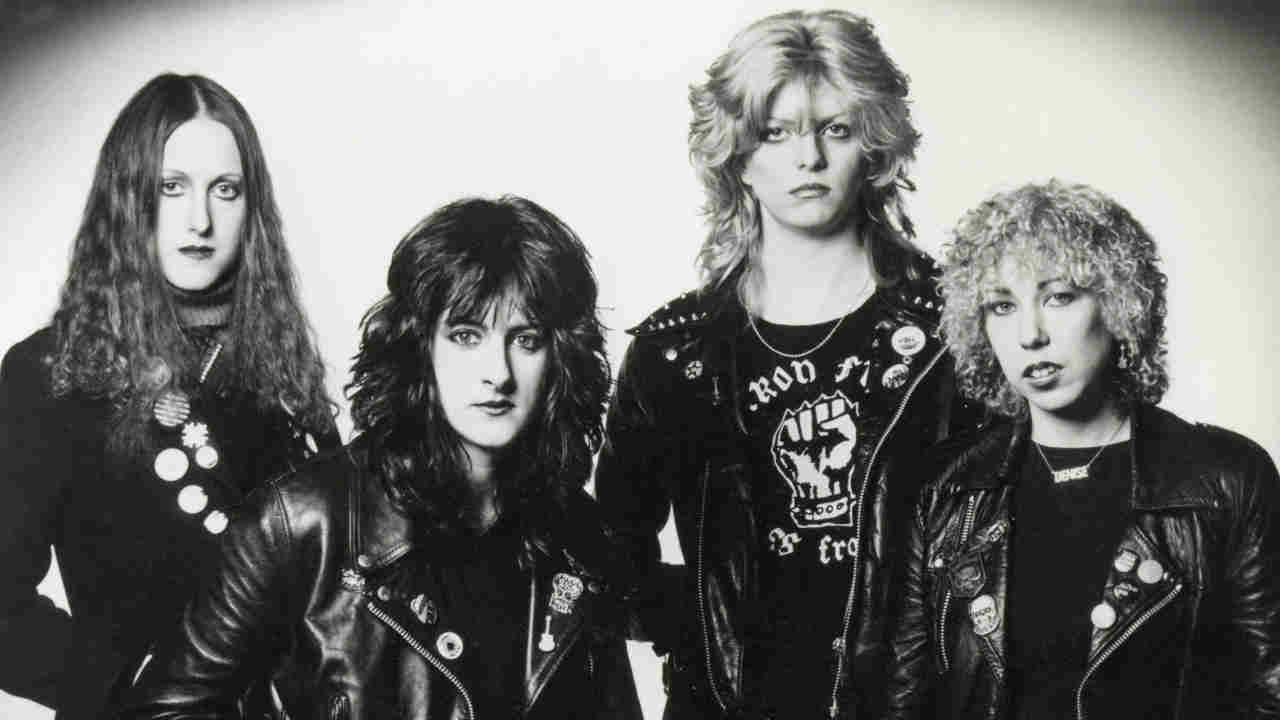Iron Maiden’s Iron Maiden: the debut album that changed metal
How five working class heroes from East London helped kickstart the 80s

As we know them so fondly today, Iron Maiden are six supremely successful rock stars who, armed with an expansive catalogue of music, circumnavigate the globe on a jet often piloted by their lead singer while challenging a rival American act called Metallica for the title of the biggest heavy music act in the world.
Four decades ago it was so, so different. In January 1980, when bassist Steve Harris and his bandmates arrived at London’s Kingsway Studios to hammer down their songs in the form of a debut album, he was a mere 23 years old. As Iron Maiden entered the 1980s, their discography amounted to a solitary EP, the self-financed Soundhouse Tapes, with the song Wrathchild about to appear on the compilation album Metal For Muthas. Two previous attempts to formulate an album had failed to get off the runway, but Paul Di’Anno, the band’s vocalist of the era, doesn’t recall a mood of anxiety.
“Nah,” he exclaims today, looking back on the experience, “there was too much excitement to feel any pressure. We knew that what we had was unique compared to every other band around, and we had spent the previous couple of years playing every shithole in the UK, also some decent venues as well. The only person who might have had any doubts was me. Though I was a cocky frontman, I was all mouth and no trousers, and when I got into the studio I realised I didn’t know what the fuck I was doing.”

It’s quite an admission. Although the previous few months had seen the band introduce a pair of new recruits – guitarist Dennis Stratton and drummer Clive Burr – Paul Di’Anno pretty much stood alone; he was stoic in his refusal to do anything he didn’t agree with, vocal in his belligerence against the status quo, a pressure cooker waiting to blow.
There was another problem. Because Maiden were forced to make their debut album within a very specific window of opportunity, before the Metal For Muthas tour started in February, the producer they really sought, Martin Birch, was busy with Black Sabbath and their post-Ozzy record, Heaven And Hell. Nobody can quite remember how Maiden ended up with Wil Malone, who’d also worked with the Sabs but as a conductor and arranger.
Through gritted teeth, Steve Harris would later recall: “We used to laugh about [Malone] sitting there with his feet up on the desk, smoking a big cigar and reading Country Life – because he didn’t do fuck all else. We’d try to get some feedback off this guy and he’d just go: ‘Oh, I think you could do better.’ So in the end we just ignored him.”
Sign up below to get the latest from Metal Hammer, plus exclusive special offers, direct to your inbox!
Consequently, Iron Maiden was pretty much made by the band – who, let us not forget, were pretty much freshmen in such an environment – in conjunction with engineer Martin Levan.
These days, given Maiden’s standing in the world, it’s hard to imagine them tolerating such disrespect. “I don’t remember the guy sitting with feet up on the desk,” Paul laughs. “Had I seen that, I’d have clouted him around the ear’ole. What I do know is that all the songs on that first album are fucking great; it’s such a shame that the production is complete dogshit.”
The singer exaggerates a little. While the album does a decent enough job of mirroring the raw energy of the band in their youthful prime, from the multi-tempoed rifferama of Phantom Of The Opera to the hard-edged commerciality of Running Free, the telling clarity, colour and military professionalism of later recordings is sorely missed.
There could be no criticism of the material, penned almost exclusively by Steve Harris. Guitarist Dave Murray chipped in with Charlotte The Harlot, the story of a prostitute who charged a fiver for starters, ‘And 10 for the main course’, while Paul Di’Anno’s name appeared alongside that of the bassist on two tracks – Running Free and Remember Tomorrow. According to legend, Paul’s lyrics for the former track drew upon his days as an East End skinhead.
“That’s all a load of bollocks,” retorts the singer now. “A skinhead? Don’t make me laugh. But it’s a rebellion song, isn’t it? It’s ‘fuck you, I won’t do what you tell me.’ I was going to do what I wanted, running free. It’s funny that the words mention an LA jail – little did I know that in the future I would end up in one of those [Paul was arrested by the LAPD in 1991].”
Although Steve has always made a big deal of despising punk rock, it’s hard to overlook the spiky-topped aggression that lay beneath so many of the album’s songs, enhanced by the don’t-give-a-fuck roar of Paul Di’Anno, a man who very much appreciated the rival genre.
“If there was a punk element to Iron Maiden at that point it probably came from me – especially onstage,” he believes. “There’s no denying it, those songs are bloody fast, though they also have some proggy time-changes in them. That’s what made us so unique.
“I love the excitement of punk because it allowed everyone to have a go, not just those up in their ivory towers,” Paul continues now. “Half-an-hour-long guitar solos didn’t really do it for me. Something’s got to be real, no matter how bad or good it might be.”
Dennis Stratton, on the other hand, adored guitar solos and the mellifluous possibilities they could bring to the music. One evening when the rest of the band had gone home, he and studio assistant Martin Levan added layers of six-string embellishment and harmony voices to Phantom Of The Opera, à la Bohemian Rhapsody.
“We didn’t expect Rod [Smallwood, manager] to hear what we’d done – it was only a mess-about,” recalls Dennis, “but somehow he did and we were told: ‘You can take those off for a start, it sounds like bloody Queen.’ I realised that there was only one guv’nor in the band and stepped back from trying to submit songs.”
Out on the road promoting Iron Maiden was where the real issues with Paul began to emerge. “Paul was having a bit of an identity crisis,” remembers Dennis. “One minute he was singing like Sting from The Police, the next he was wearing a pork pie hat [a symbol of the ska movement] onstage.”
“I used to enjoy winding up Steve [Harris] and the audience with that whole thing,” Paul guffaws at the memory. “I was one of the rare singers in heavy metal that didn’t have long hair. I dressed how I felt. Had I wanted to wear a kaftan and sandals then I’d have done so – but I never did!”
Although Maiden had put in the miles during the build-up towards the release of Iron Maiden, nobody foresaw that the debut would slam into the British album chart at No.4. “EMI had predicted it might go Top 10,” recalls Dennis. “So when it sold the way it did, that was a huge lift. And getting to do Top Of The Pops made it even better still.”
Although the programme ran out of steam in 2006, during its heyday a spot on the BBC’s primetime weekly chart show attracted millions of viewers and was worth its weight in gold. Metal and rock acts rarely appeared on the show. However, when Maiden were invited to perform Running Free in February 1980, they refused to mime as Top Of The Pops demanded, insisting upon playing live in the studio before an audience of puzzled-looking pop fans unable to dance to it. In some ways, the incident represents the start of Maiden’s fiercely stubborn yet intensely focused path to the top.
As the heavy touring began, the chasm between the singer and the rest of the band only widened. Paul antagonised headliners Judas Priest by threatening to blow them off the stage during a prize support tour, and Dennis remembers Paul trying to cancel a date on the Metal For Muthas outing due to a sore throat. Unwilling to let down their fans, Maiden played on with Steve handling lead vocals.
“Paul stood at the side of the stage staring at us with a face like thunder,” Dennis relates sadly. “And you know what? He never tried that trick again.”

Made in conjunction with Martin Birch, the producer they used until his retirement a decade later, the following year’s Killers corrected the sonic issues that had dogged the band’s debut. It also saw Dennis replaced by Adrian Smith. Maiden were not happy with the fact that while a fan of metal music, Dennis, who was several years their senior, also enjoyed more melodic alternatives such as US soft-rockers the Eagles.
Put plainly: it worried them that he sometimes preferred the bonhomie of travelling with the road crew to a tourbus with his bandmates.
“When Rod sat me down to tell me I was out of Maiden, it wasn’t a decision he could really explain, except to say that as he saw it I didn’t feel like a member of the band,” Dennis explains now. “Back then Rod was a young, relatively inexperienced manager but he knew he had something that was going to be massive, so he wrapped the band up in cotton wool to make sure nothing could go wrong.”
With Adrian, their original first choice, at last able to commit to joining them, Iron Maiden set their sights upon becoming the biggest metal band in the world. But first they needed a singer to depend upon in every given scenario. In September 1981, Paul was fired, with the long-haired, leather-clad, equally ambitious former Samson singer Bruce Dickinson ready, willing and able to take them to the next level and beyond.
“I don’t blame them for getting rid of me,” Paul sighs. “Obviously, the band was Steve’s baby, but I wish I’d been able to contribute more. After a while that got me down. In the end I couldn’t give 100% to Maiden anymore and it wasn’t fair to the band, the fans or to myself.”
Four decades on, neither Paul nor Dennis harbour a grudge and both went on to carve out careers of their own. They remain fiercely proud of their contributions to the Iron Maiden legacy.
“Sure, they’ve made some small mistakes along the way, but Steve never changed his vision,” Dennis observes. “Allowing Adrian and Bruce to become more involved [with the composition] has made them more consistent. Steve is a magnificent band leader and a brilliant songwriter.”
“The two albums I made with the band were pivotal [to the genre],” Paul Di’Anno sums up. “Later on in my life when I met Metallica, Pantera and Sepultura and they told me that those albums were what got them into music, it made me incredibly proud.”
Originally published in Metal Hammer #332

Dave Ling was a co-founder of Classic Rock magazine. His words have appeared in a variety of music publications, including RAW, Kerrang!, Metal Hammer, Prog, Rock Candy, Fireworks and Sounds. Dave’s life was shaped in 1974 through the purchase of a copy of Sweet’s album ‘Sweet Fanny Adams’, along with early gig experiences from Status Quo, Rush, Iron Maiden, AC/DC, Yes and Queen. As a lifelong season ticket holder of Crystal Palace FC, he is completely incapable of uttering the word ‘Br***ton’.
